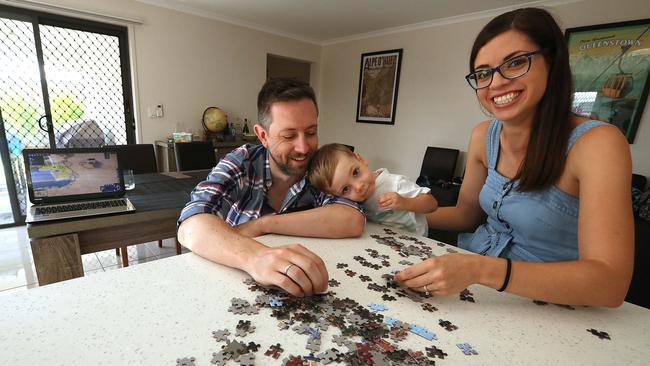Coronavirus: outgoing find it tough going but introverts have issues too
How people are faring during the great coronavirus shutdown depends on their personality, experts say.

To scratch his extrovert itch during the lockdown, Dylan Malloch will set up Skype meetings with his two Melbourne siblings, a sister working in Switzerland and their parents who run a small B&B in northern Italy.
“Or I’ll organise computer games with my friends. A bit nerdy, I know, but it’s really a once-a-week virtual catch-up,” the Brisbane marketing director says.
His wife, Clare, a self-described introvert, has discovered jigsaws and jogging as new outlets to find her “me” time. “The running is just a couple of kilometres a couple of times a week, but I like the endorphins and it gets Lois (the dog) out of the house.”
Like so many at the moment, the Mallochs are having to find new ways to adjust to a smaller, quieter world, but they come at it from different ends of the extroversion spectrum. “If I’m by myself for a long time, I get tired or run down, and need contact with people to re-energise me,” Dylan says.
Clare says it’s the opposite for her. “I find interacting with people really draining. I relax more when I’m by myself.”
How people are faring during the great coronavirus shutdown depends on their personality, experts say. And the story is more nuanced than simply introverts thriving and extroverts wilting.
Andrew Chanen, director of clinical programs and services at Orygen mental health service, says there are five accepted elements of personality.
“There’s neuroticism, which is proneness to negative emotions and emotional instability; agreeableness, characterised by compassion, courtesy and respect; extroversion, which is assertiveness; conscientiousness, measured by diligence and orderliness; and finally openness, a willingness to experience, a part of which is intelligence,” he says.
“You can imagine that what we are living through with COVID-19 provides fertile ground for those at the edges of those personality elements. Someone very high in extroversion, for instance, might find it extremely difficult to contain themselves in social isolation, not because they are high in entitlement but simply because the pressure gets too much.”
Luke Smillie, associate professor at Melbourne University’s School of Psychological Sciences, agrees extroverts are being forced to adjust in a situation favouring introverts. “One thing anecdotally that speaks to this is people saying to me, ‘I’m an introvert and I’m not coping any better now or doing anything different, but I don’t feel so bad or guilty about staying in on a Friday night’,” he says.
John Allan, president of the Australia and New Zealand College of Psychiatrists, says: “People who are extroverted are still likely to ensure they are at the centre of a lot of meetings, making lots of phone calls to find out what is going on … while introverted people might have to step back yet another notch within a house that is suddenly more crowded.”






To join the conversation, please log in. Don't have an account? Register
Join the conversation, you are commenting as Logout